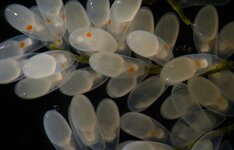I'd say rice size. The mother and eggs are under a rock and can not be seen. I had raised the rock once this morning looking for and expecting a dead Harley.
How can I tell if the eggs are fertilized?
Do I dare raise the rock a second time?
Should I and if so how to give the mother food?
I am rather stressed and would like to make this work.
I see three options, please tell me the one that is the best choice!
1. move the eggs and the rock into a breeding net box, in the same tank, with the mother.
2. move the eggs and the rock into a breeding net box, in the same tank, without the mother.
3. Move the fish and cleaner shrimp, I don't have a plan for this alternative, but if it is the best I'll make it work. I'll need to set up a new tank using some of this tanks water and rocks. with this alternative, how long will the mother and eggs need to have the tank to themselves?
Of course if you have any other ideas, I'm all ears.
How can I tell if the eggs are fertilized?
Do I dare raise the rock a second time?
Should I and if so how to give the mother food?
I am rather stressed and would like to make this work.
I see three options, please tell me the one that is the best choice!
1. move the eggs and the rock into a breeding net box, in the same tank, with the mother.
2. move the eggs and the rock into a breeding net box, in the same tank, without the mother.
3. Move the fish and cleaner shrimp, I don't have a plan for this alternative, but if it is the best I'll make it work. I'll need to set up a new tank using some of this tanks water and rocks. with this alternative, how long will the mother and eggs need to have the tank to themselves?
Of course if you have any other ideas, I'm all ears.

